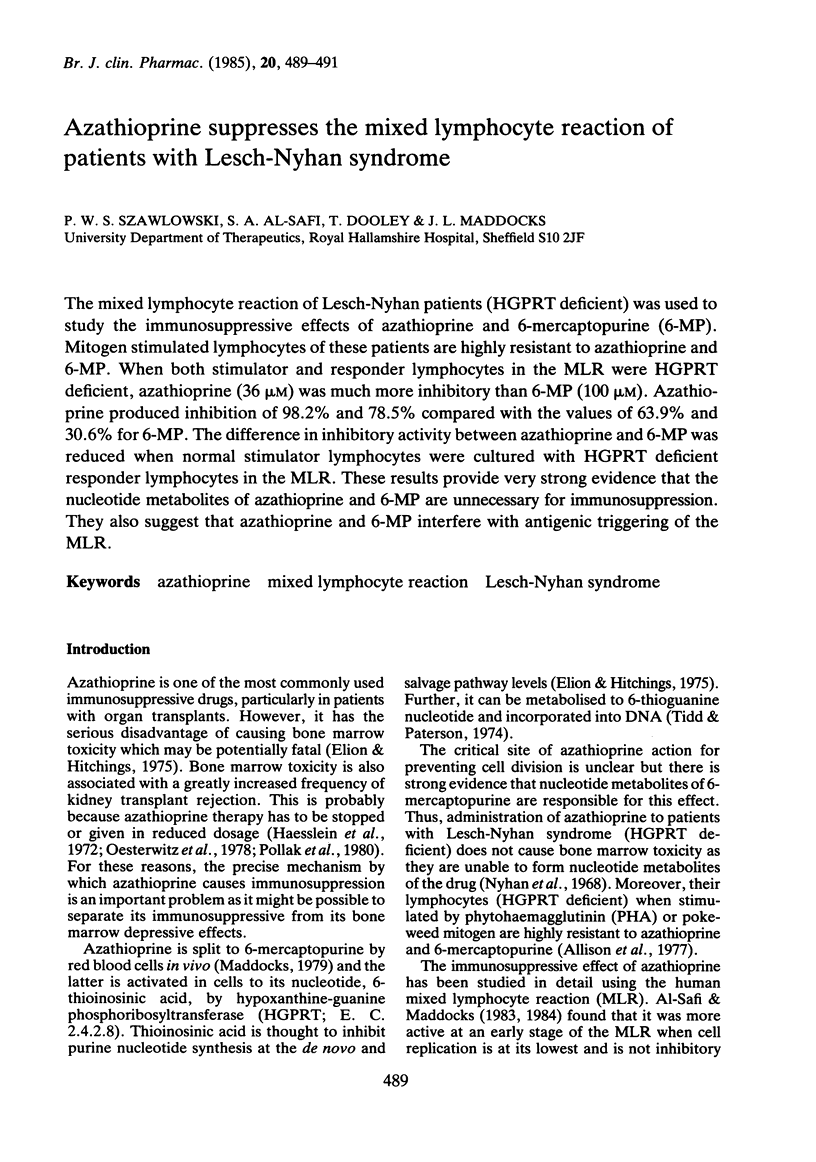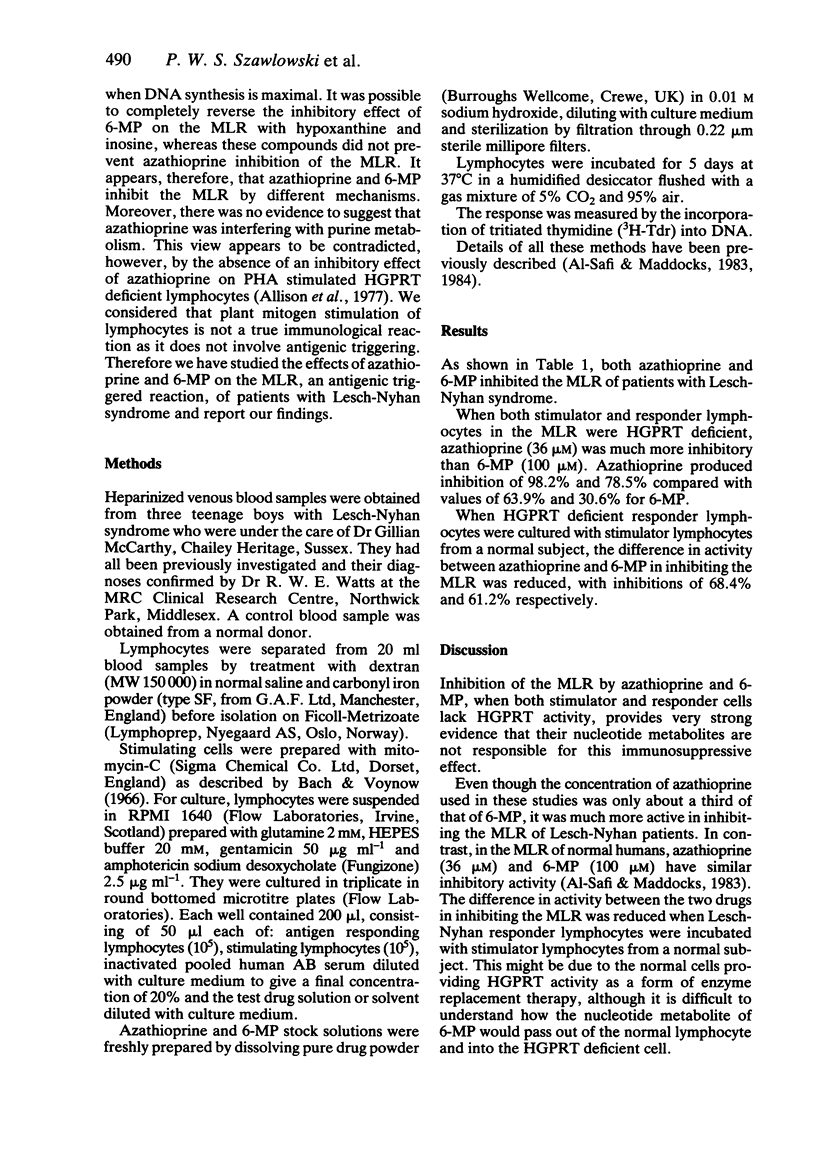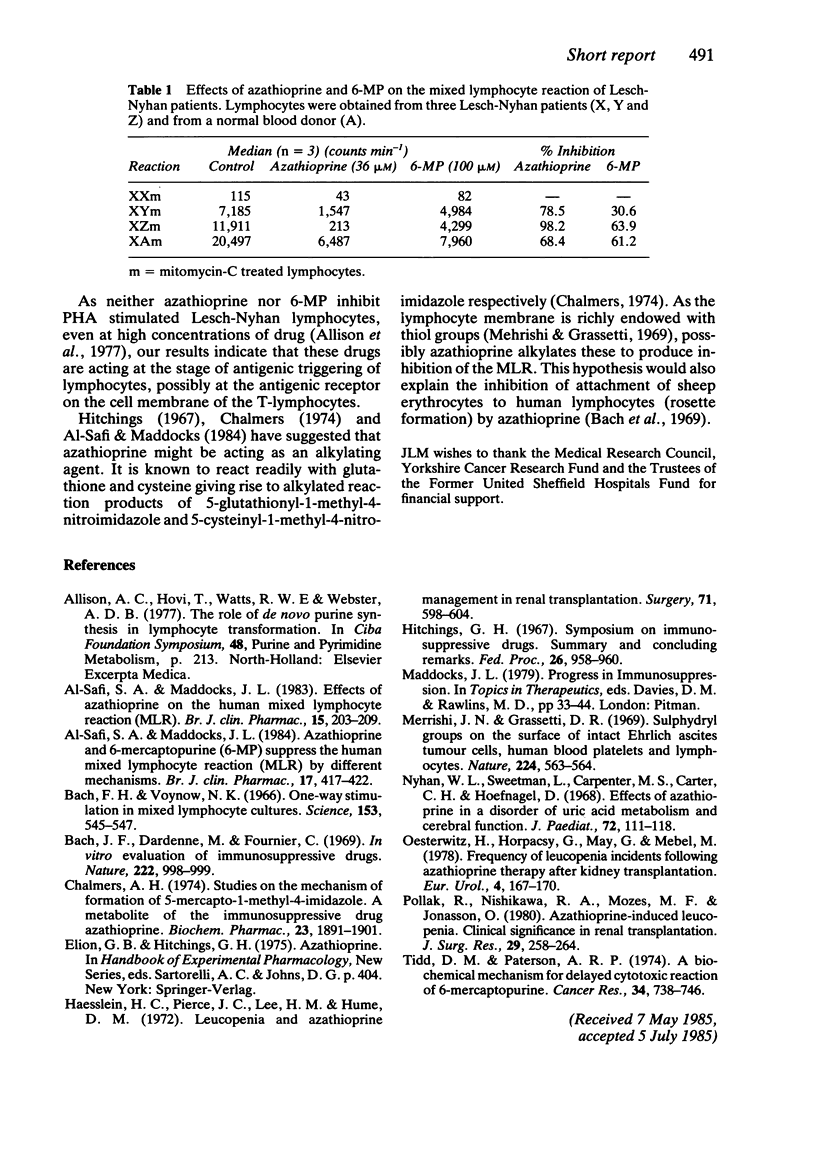Abstract
The mixed lymphocyte reaction of Lesch-Nyhan patients (HGPRT deficient) was used to study the immunosuppressive effects of azathioprine and 6-mercaptopurine (6-MP). Mitogen stimulated lymphocytes of these patients are highly resistant to azathioprine and 6-MP. When both stimulator and responder lymphocytes in the MLR were HGPRT deficient, azathioprine (36 microM) was much more inhibitory than 6-MP (100 microM). Azathioprine produced inhibition of 98.2% and 78.5% compared with the values of 63.9% and 30.6% for 6-MP. The difference in inhibitory activity between azathioprine and 6-MP was reduced when normal stimulator lymphocytes were cultured with HGPRT deficient responder lymphocytes in the MLR. These results provide very strong evidence that the nucleotide metabolites of azathioprine and 6-MP are unnecessary for immunosuppression. They also suggest that azathioprine and 6-MP interfere with antigenic triggering of the MLR.
Full text
PDF


Selected References
These references are in PubMed. This may not be the complete list of references from this article.
- Al-Safi S. A., Maddocks J. L. Azathioprine and 6-mercaptopurine (6-MP) suppress the human mixed lymphocyte reaction (MLR) by different mechanisms. Br J Clin Pharmacol. 1984 Apr;17(4):417–422. doi: 10.1111/j.1365-2125.1984.tb02366.x. [DOI] [PMC free article] [PubMed] [Google Scholar]
- Al-Safi S. A., Maddocks J. L. Effects of azathioprine on the human mixed lymphocyte reaction (MLR). Br J Clin Pharmacol. 1983 Feb;15(2):203–209. doi: 10.1111/j.1365-2125.1983.tb01487.x. [DOI] [PMC free article] [PubMed] [Google Scholar]
- Bach F. H., Voynow N. K. One-way stimulation in mixed leukocyte cultures. Science. 1966 Jul 29;153(3735):545–547. doi: 10.1126/science.153.3735.545. [DOI] [PubMed] [Google Scholar]
- Bach J. F., Dardenne M., Fournier C. In vitro evaluation of immunosuppressive drugs. Nature. 1969 Jun 7;222(5197):998–999. doi: 10.1038/222998a0. [DOI] [PubMed] [Google Scholar]
- Chalmers A. H. Studies on the mechanism of formation of 5-mercapto-1-methyl-4-nitroimidazole, a metabolite of the immunosuppressive drug azathioprine. Biochem Pharmacol. 1974 Jul 1;23(13):1891–1901. doi: 10.1016/0006-2952(74)90198-1. [DOI] [PubMed] [Google Scholar]
- Haesslein H. C., Pierce J. C., Lee H. M., Hume D. M. Leukopenia and azathioprine management in renal homotransplantation. Surgery. 1972 Apr;71(4):598–604. [PubMed] [Google Scholar]
- Hitchings G. H. Symposium on immunosuppressive drugs. Summary and concluding remarks. Fed Proc. 1967 May-Jun;26(3):958–960. [PubMed] [Google Scholar]
- Mehrishi J. N., Grassetti D. R. Sulphydryl groups on the surface of intact Ehrlich ascites tumour cells, human blood platelets and lymphocytes. Nature. 1969 Nov 8;224(5219):563–564. doi: 10.1038/224563a0. [DOI] [PubMed] [Google Scholar]
- Nyhan W. L., Sweetman L., Carpenter D. G., Carter C. H., Hoefnagel D. Effects of azathiprine in a disorder of uric acid metabolism and cerebral function. J Pediatr. 1968 Jan;72(1):111–118. doi: 10.1016/s0022-3476(68)80413-5. [DOI] [PubMed] [Google Scholar]
- Oesterwitz H., Horpacsy G., May G., Mebel M. Frequency of leukopenia incidents following azathioprine therapy after kidney transplantation. Eur Urol. 1978;4(3):167–170. doi: 10.1159/000473941. [DOI] [PubMed] [Google Scholar]
- Pollak R., Nishikawa R. A., Mozes M. F., Jonasson O. Azathioprine-induced leukopenia--clinical significance in renal transplantation. J Surg Res. 1980 Sep;29(3):258–264. doi: 10.1016/0022-4804(80)90169-9. [DOI] [PubMed] [Google Scholar]
- Tidd D. M., Paterson A. R. A biochemical mechanism for the delayed cytotoxic reaction of 6-mercaptopurine. Cancer Res. 1974 Apr;34(4):738–746. [PubMed] [Google Scholar]


